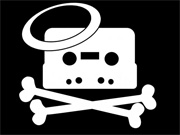TorrentFreak Email Update |
- Piracy Takedown Notices Increase E-Book Sales, Research Finds
- Pirates Like Streaming, But Don’t Completely Abandon Ship
- Pirate Bay Founder’s Computer Was “Hacked,” Investigation Reveals
| Piracy Takedown Notices Increase E-Book Sales, Research Finds Posted: 06 Jun 2014 03:32 AM PDT
The effectiveness of these anti-piracy measures is often in doubt, since the pirated files usually reappear quickly elsewhere. But, according to new research they do have some effect. Imke Reimers, an economics researcher affiliated with NBER and Northeastern University, examined the effectiveness of these takedown notices on book sales. The results, published in the working paper “The Effect of Piracy Protection in Book Publishing,” show that e-books sales increase as a result of the takedown efforts. In her research Reimers compares sales of book titles before and after takedown notices are issued, to see the effect on book sales across different titles, genres and formats. The study is the first of its kind and reaches the conclusion that piracy protection increases e-book sales. “This paper is the first to empirically analyze the interaction of online piracy and the legal market for books. It finds that piracy protection significantly increases regular unit sales of e-books, while the effect on physical formats is not as clear,” Reimers writes. “E-books, the closest substitute for online piracy benefit from piracy protection by selling 15.4% more units, while there is no significant effect on other formats,” she adds. A 15 percent increase in e-book sales is quite significant, and translates to millions of dollars in revenue across the industry. For other book formats, including hardcovers, paperback and audiobooks, no sales increase was observed. The research controlled for a wide variety of third-party variables that could have influenced the results. Based on the current data Reimers is confident that the sales increase can indeed be attributed the takedown notices. However, she also spots differences in the impact on established and starting writers. More specifically, piracy doesn’t appear to pose a threat to the e-book sales of starting authors and could even serve as a promotional tool. “The effect varies by the title’s level of popularity. For well-known books and those by popular authors, online piracy mainly poses a threat to regular book sales, while authors who are just starting out could benefit from the additional platform. My results support this idea, at least for e-books,” Reimers writes. TorrentFreak reached out to Reimers who notes that it might be a good idea for some authors to share some of their work online. “I find no evidence that piracy protection is ‘bad’ for any books, but it seems that more obscure titles could benefit from the advertising effect of pirated versions. Some emerging authors offer their titles or excerpts of their titles for free on their websites – exactly to advertise their works. My results suggest that this might be a smart move,” she tells us. The research is based on data from Digimarc, one of the leading piracy protection firms for the book industry. Needless to say, the company is happy to hear that their efforts indeed appear to have an effect. “This new research strongly validates our position that Digimarc Guardian's anti-piracy strategies provide a substantial return-on-investment for customers, in the form of increased legitimate sales and revenue,” Chris Shepard, Director of Product Management at Digimarc, informs us. Digimarc assured TorrentFreak that they had no hand in the academic research other than providing the piracy takedown data. The sales data used for the research comes from the leading independent e-book publisher RosettaBooks. Needless to say, they are also happy with the results. “Rightsholders feel exposed or taken advantage of by piracy. We believe that Digimarc's services improve our overall sales and the effect of dampened piracy greatly exceeds the cost of the service,” Greg Freed, eBook Production and Distribution Director at RosettaBooks tells TorrentFreak. While the research indicates that takedown notices can have a positive effect on e-book sales, future research will have to show whether or not this can be generalized to other industries, including the movie and music business. In any case, with the above in mind it’s expected that the volume of takedown notices will only increase in the near future, a trend that has been going on for several years now. Source: TorrentFreak, for the latest info on copyright, file-sharing and anonymous VPN services. |
| Pirates Like Streaming, But Don’t Completely Abandon Ship Posted: 05 Jun 2014 10:46 AM PDT
A YouGov study in the same year suggested this was a good move. While many people admitted engaging in piracy they also indicated a desire to obtain their movies and TV shows from legal sources – if those services were convenient and accessible. Two years on and YouGov are back with a new media consumption study of 1,180 Danes aged between 20-65. Commissioned by TDC Group, Denmark’s leading telecoms company, it reveals encouraging signs for the both the entertainment industry and the government’s strategy, but also an interesting twist. Firstly, piracy of both movies and TV shows is down. This year’s survey suggests that illegal consumption of movies sits at 5.1 million copies. That’s down from the 5.8 million reported in last year’s study and the 8.6 million from 2012. TV shows tell a similar story. In 2012, around 10 million TV shows were pirated, a figure that dropped to 8.1 million in 2013. This year’s study shows a drop again to 7.9 million copies. According to TDC Group media director Ulf Lund, the continued decrease in the consumption of infringing content is due to the development of legal offerings. “Our position has always been that the best way to combat illegal consumption is by developing good legal alternatives,” Lund says. “This is what we can see now that services like Netflix, HBO, Viaplay and YouBio have really materialized here at home.” The study’s findings show that the public is responding to this increased availability. In last year’s survey 32 percent of households with resident 20 to 65-year-olds reported subscribing to a premium streaming service. This year that figure increased to an impressive 45 percent. But while piracy of movies and TV shows continues to fall in the face of impressive take-up of streaming services, it appears that pirates aren’t prepared to kick their old habits just yet. The study found that the total of those who download or stream illegally has not significantly changed from last year, with 15 percent of respondents admitting that someone in their household had obtained content illegally in the preceding three months, up from 14 percent in 2013. “Things are certainly going in the right direction, but we are far from there yet,” Lund says. “Magnitude has decreased, but the level is still very high and there are still many who admit that they consume content illegally.” Source: TorrentFreak, for the latest info on copyright, file-sharing and anonymous VPN services. |
| Pirate Bay Founder’s Computer Was “Hacked,” Investigation Reveals Posted: 05 Jun 2014 06:44 AM PDT
After several custody extensions Svartholm appeared in court again a few days ago. During the court session the court presented new evidence, backing up the theory that someone else used Svartholm’s computer to carry out the hacks. The court released the results of an investigation into Svartholm’s computer, which was carried out in February. The released data cover the results of several antivirus scans and the identification of hundreds of suspicious files. TorrentFreak spoke to Svartholm’s lawyer Luise Høj, who explained that the computer contained several threats, some dating back to 2011. The list includes trojans and exploits that could have allowed an outsider to take control over the machine. “This is definite evidence that the computer has been compromised – and that the attacker has gained administrator privileges, no less,” Høj informs TorrentFreak. Despite being aware of the evidence for several months the court maintains the position that Svartholm should remain in custody. His lawyer, however, is convinced that the investigation can plead the Pirate Bay founder free. “For me this is a clear evidence that Gottfrid has been telling the truth all along – and in my opinion it shows that the Danish legal system has big difficulty handling cases which require a certain level of technical insight as regards computers,” Høj tells us. Gottfrid’s mother Kristina Svartholm shares this opinion. She can’t understand why it took the court several months to present the evidence. According to her, this may not be just a simple mistake. “Perhaps ‘malice’ is a more appropriate word,” Kristina Svartholm tells us. “Their methods leave me more and more worried.” “Gottfrid’s own conclusion is that they have tried to hide them as long as possible just because everything points in his favor,” she adds. The next hearing in Denmark is currently scheduled to take place at the end of this month. Both Svartholm’s lawyer and mother hope that he will be released, in part based on the new information. The hacking trial is expected to start in September. Source: TorrentFreak, for the latest info on copyright, file-sharing and anonymous VPN services. |
| You are subscribed to email updates from TorrentFreak To stop receiving these emails, you may unsubscribe now. | Email delivery powered by Google |
| Google Inc., 20 West Kinzie, Chicago IL USA 60610 | |


